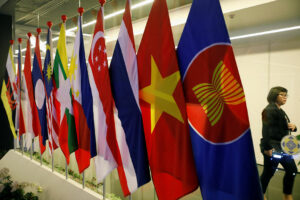THE Philippine agenda for its chairmanship of ASEAN will feature enhanced freedom of movement for goods, investment, and talent, Trade Undersecretary Allan B. Gepty said.
At the Public-Private Sector Dialogue on the Philippines 2026 Priority Economic Deliverables, Mr. Gepty said: “We aim to strengthen linkages that allow goods to move faster, investments to flow more freely, talent to circulate more efficiently, and innovation to be shared across borders,” he said.
“To realize this ambition, we have identified five strategic thrusts,” he added, which include strengthening trade and investment linkages in recognition of the role of openness and connectivity in the region’s economic success.
“Yet for ASEAN to remain competitive, we must raise our standards of reliability, security, and interoperability,” he said.
The Philippine stint at steering ASEAN will focus on “deepen(ing) regional connectivity, mindful of the value of security in the region, mobility of our people, energy efficiency, supply chain resilience, and industrial capability in semiconductors in particular,” he added.
The second pillar of the Philippine agenda is accelerating digital transformation to ensure the region’s cohesion and competitiveness, he said.
“Digital technologies are reshaping the global economy at a pace that leaves no room for complacency,” he said.
“Whether through artificial intelligence (AI), the digitalization of supply chains, or the rapid rise of cross-border digital services, ASEAN stands at the threshold of a historic opportunity,” he added.
Next year, the region expects to sign the ASEAN Digital Economy Framework Agreement, which aims to create a unified, interoperable, and innovation-friendly digital economy.
“Interestingly, this agreement has the potential to unlock as much as $1 trillion in additional gross domestic product by enabling digital trade and promoting trusted data governance and secure, seamless digital transactions across borders,” he said.
The next area of focus is the creative economy and innovation, citing their role in driving productivity, competitiveness, and resilience.
“It is important that we unlock the financial value of ideas, inventions, designs, and creative works. It is imperative that our stakeholders should see the value of their intangible assets,” Mr. Gepty said.
“We will empower technology transfer practitioners, startups, artists, and innovators by providing a standardized approach to valuing intangibles across the region,” he added.
The Philippines will also be leading the establishment of the ASEAN Center for Creative Industries.
“The center will be a dynamic hub for policy dialogue, capacity-building programs, and collaborative projects that span digital media, film, music, design, and other creative sectors,” he said.
“Complementing this will be the development of a regional plan of action for AI in healthcare, ensuring that innovation strengthens public health systems and improves the well-being of our people,” Mr. Gepty said.
The Philippines’ next area of focus is to advance sustainable and inclusive economies, reflecting the global imperative to align growth with environmental responsibility and social equity.
“As one of the world’s most climate-vulnerable regions, ASEAN cannot afford to pursue development at the expense of the environment. We need initiatives that help farmers transition to climate-smart practices while improving productivity and food security,” he added.
ASEAN will also step up efforts to promote green investment.
“Our work will extend to sustainable tourism, destination readiness frameworks, and even a regional declaration on sustainable space science to illustrate the depth of ASEAN’s ambition and diversity that require collective action,” he added.
The Philippines will also be pushing for the integration of micro, small and medium enterprises (MSME) into the development agenda.
“This is an area that lies at the heart of inclusive growth. MSMEs account for the majority of ASEAN’s enterprises and employ most of our workers,” he said.
“Under the Philippine chairship, we will advocate for a center tasked with delivering high-quality training, research, mentorship, and enterprise support,” he added. — Justine Irish D. Tabile

